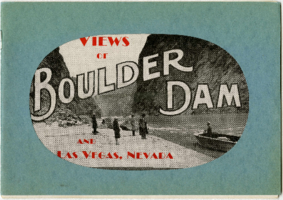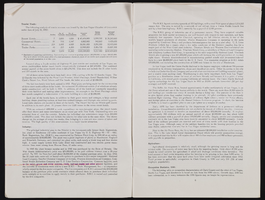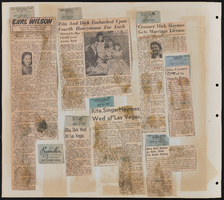Search the Special Collections and Archives Portal
Search Results
News clips about the Stratosphere Tower making low revenue after opening: video
Date
Archival Collection
Description
Three news segments from KVBC Channel 3 about the Stratosphere Tower making low revenue for gaming and hotel occupancy after the casino's first six weeks of operation; News presenters in the clips include Rikki Cheese, Dave Courvoisier, and Helen Kumari; interview of Tom Bruny from Stratosphere appears in all three clips; b-roll of Stratosphere Tower, gambling, rides on top of Stratosphere Tower, Top of the World restaurant, gift shop, the Danny Gans show, and casino guests. Original media VHS, color, aspect ratio 4 x 3, frame size 720 x 486. From the Bob Stupak Professional Papers (MS-01016) -- Professional papers -- Audiovisual material -- Digitized audiovisual clips file.
Moving Image

Views of Boulder Dam and Las Vegas, Nevada
Description
"N.E. Johnson, photographer and publisher." Booklet consists primarily of photographs of the Colorado River in Black Canyon, prior to the construction of Hoover (Boulder) Dam, and photographs of people and businesses in early 20th-century Las Vegas.
Text
Audio clip from interview with Al Levy by Cheryl Caples, February 23, 1979
Date
Archival Collection
Description
Part of an interview with Al Levy on February 23, 1979. In this clip, Levy discusses his childhood, living in Las Vegas, and his experience at Las Vegas High School.
Sound

Transcript of interview with Ronald "Ron" Lurie by Stefani Evans and Claytee D. White, October 17, 2016 and November 10, 2016
Date
Archival Collection
Description
Ron Lurie is a product of Las Vegas. Ron Lurie knows Las Vegas. The Los Angeles native arrived in Las Vegas with his parents when he was twelve years old; his father opened Market Town next to White Cross Drug Store. Lurie graduated from Las Vegas High School in 1958 and attended Nevada Southern, where he played baseball and basketball before joining the United States Army Reserves. Returning from training, he began working at a new store, Fantastic Fair. Soon the owner, builder Lloyd Whaley, asked him to manage a new Fantastic Fair. At 24 years of age, he managed the entire Fantastic Fair store, which later became Wonder World. Over time, Lurie would manage three of the four Wonder World stores. In this interview, the former mayor of the City of Las Vegas and former Las Vegas City Council member talks about running for City council because he wanted more parks and ball fields downtown and about his political career, which coincided with the years of explosive growth in the 1970s and 1980s. The current vice president and general manager of Arizona Charlie's also v discusses his careers in the grocery business and in gaming; he speaks to giving back to the community and the changing demography of the area surrounding Arizona Charlie's; he talks of the ways Steve Wynn pioneered an aura of glamour that helped to upgrade Downtown Las Vegas; he recalls the challenges of public safety, regional transportation, flood control, and the Monorail and of civic dreams of a magnetic levitation train that would connect Downtown Las Vegas to Cashman Field. He remembers his parents and his wife; he talks about his children, and he shares vignettes of, among many others, Ernie Becker IV, Bill Briare, Al Levy, Steve Miller, and Bob Stupak. Throughout, Mayor Lurie especially beams when he talks about his family, his friends, his work, Las Vegas, the Boys and Girls Clubs, and baseball. This man loves baseball.
Text

Transcript of interview with Walter John Ritzau by Elizabeth Garrison, February 25, 1977
Date
Archival Collection
Description
On February 25, 1977, Walter John Ritzau interviewed Elizabeth Schneehagen Garrison (born 1943 in Las Vegas, Nevada) about her life in Southern Nevada. Garrison first talks about her schooling in Las Vegas and her first homes in Las Vegas. She also discusses the atomic testing, the Devils Hole in Ash Meadows, early church involvement, recreational activities, and some of the environmental aspects of Las Vegas. Garrison later describes her work for the Central Telephone Company before describing the Helldorado parade and some of the early activities designed for children. In the latter part of the interview, she describes her father’s garden, the changes in the city environment and building, shopping locations, and more about her home life.
Text

Transcript of interview with Fred B. Houghton by Philip Partridge, February 9, 1975
Date
Archival Collection
Description
On February 9, 1975, Philip Partridge interviewed former attorney, Fred B. Houghton (born August 27th, 1894 in Chicago, Illinois) in his home in Las Vegas, Nevada. The two discuss how Houghton first moved to Las Vegas and how he came to practice law. The interview concludes with Houghton’s thoughts of Southern Nevada.
Text
Revere, Lawrence
Lawrence Revere, born Griffith K. Owens (d. 1977), was a former casino pit-boss and the "Master of Blackjack." He is most famous for the co-development of several blackjack systems and for publishing Playing Blackjack As A Business in 1969. During the 1960s and 1970s, Revere, also known as Leonard "Specs" Parsons and Paul Mann, was considered a blackjack expert. After his competitive career ended, he retired to teach blackjack and gambling. Revere died on April 23, 1977 after a bout with lung and liver cancer.
Person



